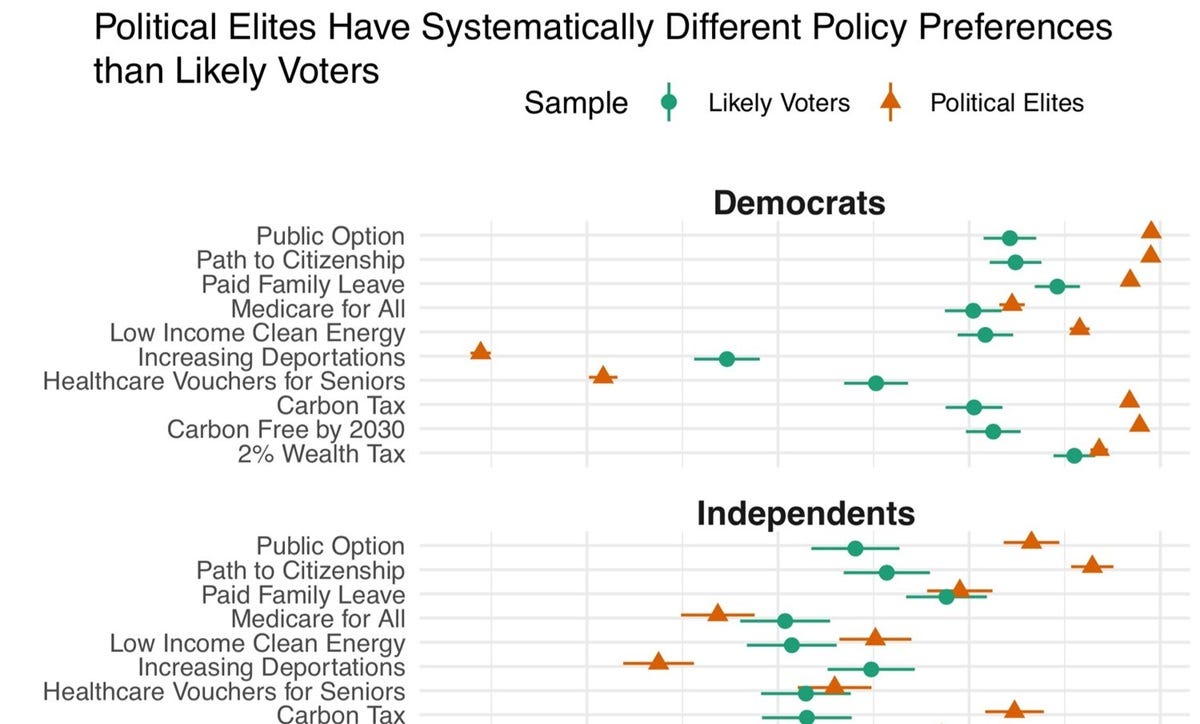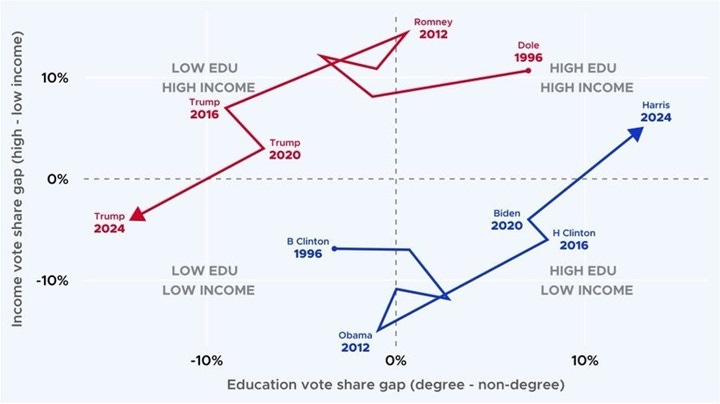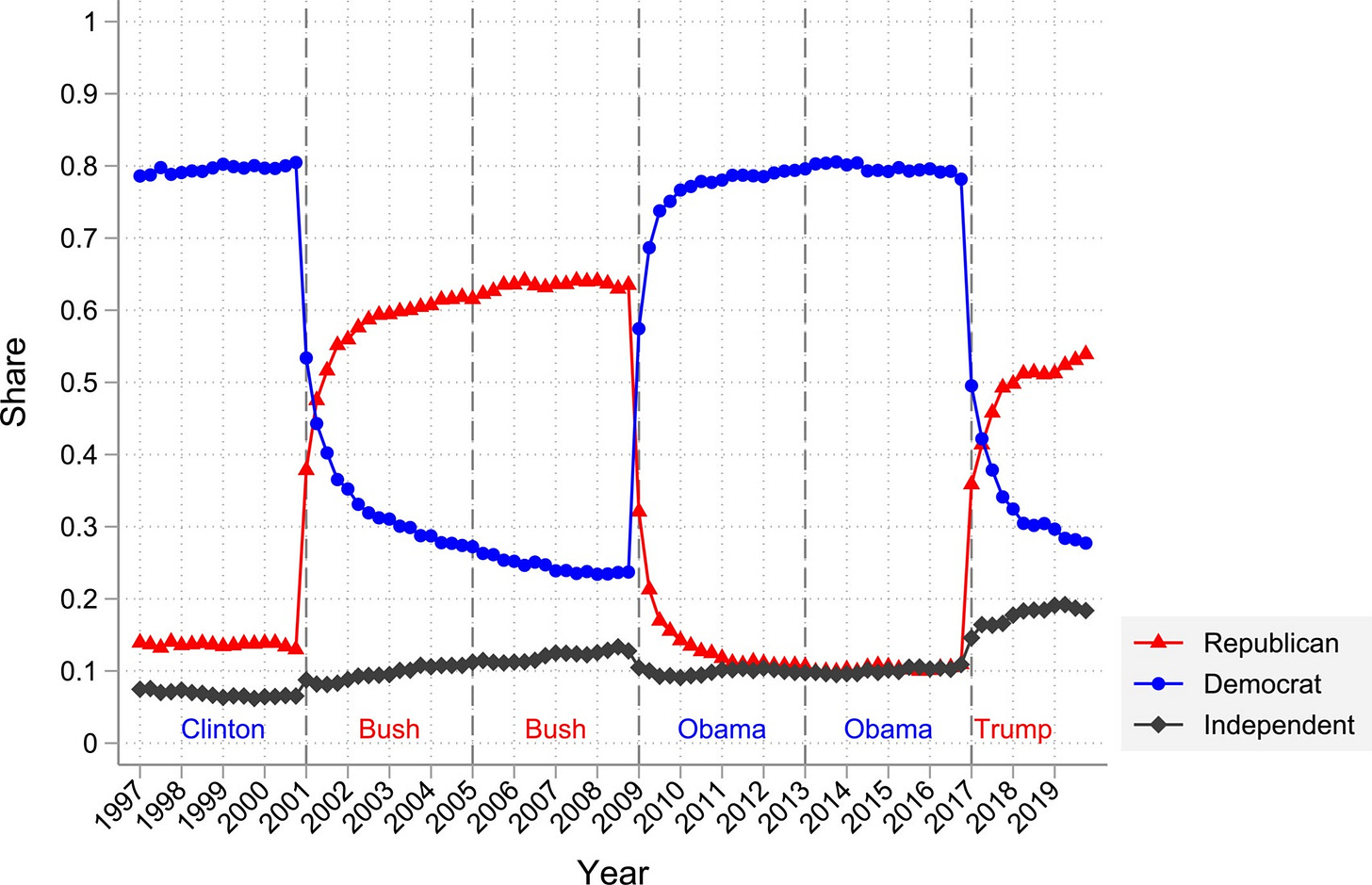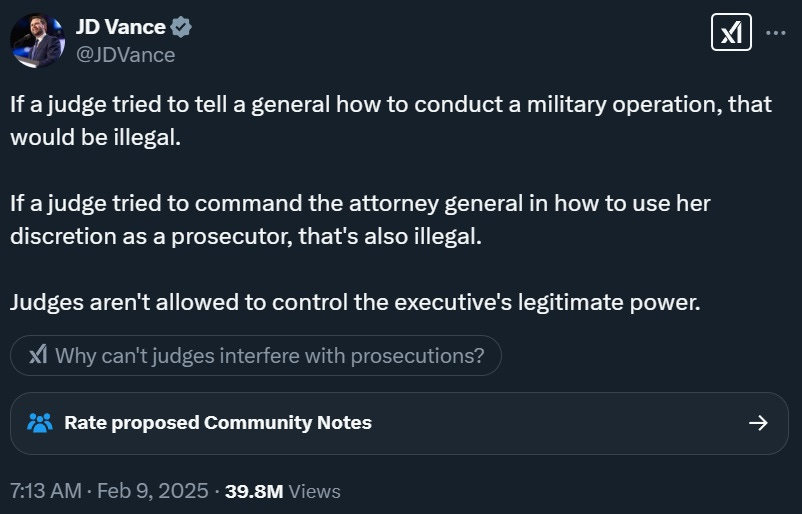What I think DOGE is really up to
And what I think we should actually be worried about.
Of all the chaos that Donald Trump’s second term is visiting upon America, nothing compares to DOGE. Trump repurposed an existing agency, the U.S. Digital Service, interpreted its mission extremely broadly, and handed control of it to Elon Musk. With the blessing of the Trump administration, DOGE has been going through every part of the U.S. federal government, looking for payments to cancel, programs to suspend, and employees to fire or place on leave.
Over the last two weeks, DOGE has moved so fast, and often so secretively, that nobody can quite seem to figure out what it’s doing. The whole thing is shrouded in a fog of chaos, with accusations and counter-accusations of illegality flying thick and fast. It’s very hard to follow all of these, much less evaluate their accuracy. Instead of evaluating all of these — something my lack of legal expertise makes me poorly qualified to do — I thought I’d focus on two key questions:
What is the actual purpose of DOGE?
What are the main dangers of DOGE?
In my opinion, answering these two questions is crucial if we want to understand how to approach the DOGE issue.
So far, I think most of the coverage of DOGE has been purely reactive — raising questions about the legality of specific DOGE moves, digging up dirt on the people who work for DOGE, or decrying breaches of data privacy. While there’s nothing wrong with that kind of coverage, I think if that’s all there is, it represents too slow-footed and passive of a reaction to Musk’s furious blitz of activity. In order to really grapple with what’s going on at the federal government, we need to think not only about what DOGE is doing right now, but what it’s going to do in the future.
A hypothesis about DOGE’s true purpose
Everyone seems to be freaking out so much about the particulars of what DOGE is doing — which employees it’s trying to fire, which programs and payments it’s trying to cut — that very few people seem to be asking why this is happening.
DOGE is an enormous undertaking, with teams stationed in every single government agency, combing through essentially everything the government does. No Republican administration — even the fervently anti-government Reagan, or Trump in his first term — has ever attempted anything like this. The opportunities for bad optics, lawbreaking (purposeful or accidental), and accidental cutting of useful programs are vast. So why do it now?
Most people following the story seem to be taking Musk at his word, and assuming that fiscal austerity and slashing the federal workforce are his true ultimate goals. But I think that while Musk and his people honestly do think that much of government spending is wasteful, there are some problems with the hypothesis that ideological small-government Reaganism is their main motivation.
For one thing, Trump and his people are signing off on everything Musk does, and they don’t actually seem to care that much about deficits — Trump’s promised tax cuts far outweigh any spending cuts that DOGE would be able to carry out, and Trump increased the deficit in his first term.
As for drowning the bureaucracy in a bathtub, this has never really been much of a GOP priority, so it would be strange for it to suddenly rocket to the top of the queue. And it’s worth remembering that the civil service are the ones who actually carry out Trump’s executive orders — without civil servants, Trump’s sweeping proclamations are essentially powerless. It’s unlikely that Trump would let Musk render him an impotent figurehead.
Instead, I suspect that the true purpose of DOGE — or at least, the main purpose — is to change the ideological character of the federal workforce, and of federal programs, rather than to eliminate them.
The civil service has a reputation for leaning to the left ideologically. Spenkuch, Teso, and Xu (2023) find that Democrats substantially outnumber Republicans in the bureaucracy, especially at the higher levels. This is from a summary of their results:
It was also no surprise that the researchers confirmed that Democrats outnumber Republicans or Independents in the federal workforce, as has long been public perception. Democrats made up about half of the workforce during the 1997-2019 data period (compared with about 41% of the U.S. population). Meanwhile, registered Republicans dropped from 32% to 26% during the period…
The analysis also found that Democrats even more heavily represented in the ranks of upper management jobs, topping out at 63% of senior executives, the level just below presidential appointees…[T]his discrepancy is driven largely by the fact that Democrats tend to enter the civil service with higher rates of college and graduate degrees, and tend to stay in government careers longer[.]
That’s party registration, but it’s the same story when we look at the issues. Data for Progress surveyed “political elites” (bureaucrats plus other people involved in politics) in 2021, and found that even controlling for partisan affiliation, they’re more progressive:

Why does the bureaucracy lean to the left? Part of it is just occupational choice — conservatives tend to value the private sector more highly than government, so they tend to go work there more, while progressives tend to think government is a higher calling. But as Spenkuch et al. point out, a lot of it is due to education polarization.
Education polarization is the most important fact about modern American politics — the ur-trend from which a whole lot of other trends arise as a natural consequence. Educated voters used to lean slightly to the right in America; in recent years they have become the base of the Democratic party:

The higher up the education scale you go, the more progressive you get.
Most civil service positions — especially at the higher levels — require higher education. So because the educated labor pool has become more and more progressive, it has become harder and harder to find conservatives to staff the civil service. Political appointees are a relatively small percentage of the federal workforce — most are career appointees, hired by other bureaucrats through a system that’s supposed to be merit-based — but even so, both Bush and Trump had a lot of trouble finding enough Republicans to run the bureaucracy:

In the past, Republicans were only mildly annoyed by the ideological slant of the civil service. Although bureaucrats leaned to the left in the 1980s, for example, they weren’t very hostile to business. Overall there was a general impression that the U.S. civil service was staffed by people who did their jobs faithfully, obeyed the will of the President, and didn’t see themselves as ideological crusaders.
Then came wokeness.
In the 2010s, American liberalism — which was renamed “progressivism” — was transformed by an ideological movement that many people call “wokeness”. The core belief of this ideology is that America is an inherently racist nation, and that this “original sin” must be corrected by “antiracist” action — basically, discrimination in favor of nonwhite people — at every level and in every aspect of society. The trans movement, which springs from different origins, is often considered part of the same ideology.
Although this idea largely ceased to excite protest movements and young activists after 2020, its basic precepts became an orthodoxy among older educated progressives. DEI programs and departments became pervasive throughout companies, universities, and the government. But even beyond official programs, pervasive individual attitude shifts probably had a big impact. Surveys in recent years found that large percentages of hiring managers at American companies felt like they were under pressure to “prioritize diversity over qualifications”, while a substantial minority say they’ve received explicit instructions to deprioritize hiring white men.
This is actually a pretty radical ideology — it’s probably illegal under the Civil Rights Act of 1964, but it’s also just not the kind of thing Americans would have countenanced in past decades. As a liberal who mostly disliked the “woke” turn, I was astonished at how fast the new ideology spread through my own circles, and how easily it defeated and displaced older liberal ideas about individual rights and equality. In fact, I think this radicalism itself is probably a result of education polarization — if you have a workplace where everyone has to have a degree, and everyone who has a degree is a progressive, then it’s a lot easier for really extreme forms of progressivism to spread unopposed.
But anyway, this new “woke” form of progressivism alarmed American conservatives like nothing since the communism of the 1920s or the revolutionism of the 1790s had. Elon Musk talks a lot nowadays about reducing government waste and fraud, but he started talking about the “woke mind virus” a lot earlier:
It’s not just the occasional tweet; opposition to DEI and other “woke” ideas has been one of Elon’s most consistent themes, if not the most consistent.
When Elon took over Twitter and turned it into X, his goal wasn’t to make a profit; it’s really not that profitable a business. His goal was to influence the national media conversation. He and his allies perceived Twitter as the epicenter of “woke” ideology, and did everything they could to turn it into a conservative outlet instead, relying on the platform’s strong network effect to prevent too big of an exodus. So far, that bet seems to have paid off.
It seems clear that defeating the “woke mind virus” is high on DOGE’s list of priorities — my guess is that it’s actually the #1 priority. Trump’s first action with regards to the civil service was to fire all the DEI staff. But woke attitudes are far more widespread than just the few people who are officially hired to work on DEI, and Trump and Musk are probably united on the need to root out as many as possible.
This is probably why Elon loudly made a big deal out of rehiring a DOGE staffer who was fired for racist tweets, despite having himself gone to war on X against people making similar tweets. Federal civil service workers are a lot harder to fire than workers at Twitter; many are on contract, and there’s a limit to how long they can be placed on administrative leave. Musk tried the gambit of offering a buyout to all federal employees, but very few took it. One relatively easy way of getting the government’s wokest staffers to quit is to make it clear that the culture of their workplace has changed, and an easy way to do that is to have guys who write stuff like “Normalize Indian hate”.
This also explains many of the programs that Elon is going after. Actual examples of fraud are few and far between, but a decent number of federal grants and other programs have either been outsourced to progressive NGOs, repurposed for “justice”-related goals, or had DEI programs attached to them. When the DOGE people talk about “waste” and “fraud”, it’s usually just progressive stuff like this (which, to be fair, they do consider wasteful).
In other words, the purpose of DOGE is just to do what Elon has tried to do everywhere else — purge the “woke mind virus” from American institutions. In an age where education polarization has made every elite institution culturally progressive, that’s an uphill battle. But in fact, conservatism has won a very prominent battle for control of a mostly-progressive institution in recent decades: the judiciary.
Most lawyers — being highly educated, and having eschewed a career in business — are progressives. But in recent decades, the Federalist Society — basically, a conservative club within the legal profession who hires and promotes their own people — has managed to get a ton of conservative judges installed, including a firm majority on the Supreme Court. Much like a prison gang that uses organization and toughness to make up for inferior numbers, the Federalist Society proved that cartelization can allow conservatism to thrive and even dominate, even within overwhelmingly progressive institutions.
A blueprint for conservatives to win back America’s institutions would therefore look a lot like “a Federalist Society for everything”.1 In the civil service, that would require that you have a hard core of conservative-minded career employees who hire other conservatives through the “merit” system. And the most important, high-leverage place for those conservatives to be is the Office of Personnel Management, the federal government’s human resources agency.
So it’s completely unsurprising that DOGE has worked very hard to control OPM, to fire its existing employees, and to replace them with its own people. Once DOGE has gotten rid of as many as possible of the federal government’s most progressive employees, a conservative-minded OPM will focus on hiring conservatives to replace them.2 An early example of this is how Trump’s OPM has reclassified Chief Information Officers as political appointees throughout the federal government.
This, I think, is why Trump has not viewed DOGE as a threat to his personal power. While the agency will probably end up shrinking the federal workforce, the goal is not to make government less effective. Just as at Musk’s Twitter, after a bunch of workers are fired, a crop of new ones will be hired. Only this time, they’ll be conservatives, and they’ll use their state capacity to try and chase wokeness from the rest of America’s institutions — universities, businesses, and so on.
To what degree that’s a good thing or a bad thing depends, of course, on your personal ideology. But I think there are some pretty clear dangers from the DOGE approach, which anyone who cares about American stability, prosperity, and security ought to be concerned about.
The four big dangers of DOGE
The most obvious and most immediate danger is that DOGE will spark a constitutional crisis — a power struggle between the different branches of the federal government.
The most obvious way to fight DOGE’s actions is to sue, and opponents are starting to win a few victories in court. One federal judge has barred DOGE from putting a bunch of USAID workers on administrative leave, while another has blocked DOGE’s access to Treasury Department payment systems. (Update: Another judge has blocked Trump’s modification to NIH grants.) DOGE supporters responded by attacking the judiciary itself. JD Vance tweeted that the judicial branch don’t have the power to tell the executive what to do:
This is, of course, simply an assertion that the President is an elected dictator. If the Trump administration actually attempts to follow through on this tweet by openly defying court orders, it will precipitate a major constitutional crisis between the executive and judicial branches.
A different constitutional crisis could arise between the presidency and Congress. DOGE is supposed to have “read-only” access to U.S. government payments — they’re supposed to tell the Treasury when they’ve discovered waste or fraud, and the Treasury will then decide which payments to stop. But if Trump refuses to disburse money that Congress has spent — an action known as “impoundment” — it could set up a power struggle between the executive and legislative branches.
Impoundment was common before the 1970s, when Congress banned it. Trump might take that ban to the Supreme Court. If he loses, and decides to simply refuse to spend money in the ways Congress has directed — perhaps through foot-dragging and creative readings of the letter of the law — it would count as a constitutional crisis. Essentially, if Trump wins, then Congress can’t actually spend money — it can only recommend that the President spend money.
The second big danger of DOGE is that it might degrade American state capacity. In their zeal to hunt down and eliminate wokeness, Musk & co. might interrupt, interfere with, or even destroy government programs that are doing good and valuable work. There is surely plenty of waste in the federal government, but most programs are there for a good reason.
Musk’s typical M.O. — or at least, the one he used at Twitter — is to cut employees until he starts hurting profitability, and then hire back as many people as he needs. But unlike a company, the government doesn’t have a bottom line that can be measured in dollars and cents — its purpose is to “promote the general welfare”. And because of the pervasiveness of education polarization, most of the good and necessary government programs in America are administered by “woke” progressives, some of whom have inserted their own ideological goals into those programs. If Elon goes around trying to smash and eliminate any government agency that contains woke people doing woke things, it could really hurt the U.S. economy.
To give just a few examples:
DOGE is about to start in on the Social Security Administration, which many fear could interrupt payments to one of America’s oldest and most popular social programs.
The National Science Foundation, which has helped keep America at the forefront of science and technology, is facing huge funding and staffing cuts.
DOGE has told the National Institutes of Health to dramatically reduce its “indirect costs” — money it gives universities to maintain lab facilities and so on. This is already weakening U.S. science, and will do a lot more over time.
DOGE is attempting to kill the Consumer Financial Protection Bureau, which protects consumers from financial scams.
DOGE has told the National Oceanic and Atmospheric Administration — the government agency that forecasts the weather — to expect huge budget cuts.
Only the most ardent libertarians would want to harm these programs on ideological grounds alone. I do not believe Musk is an ardent libertarian, especially given the amount of money and assistance his own companies have received from the government. What seems more likely is that progressive government employees have attached DEI initiatives to U.S. science agencies, and Elon is trying to pause operations while he roots those out.
The big danger is that when he’s convinced himself that the wokeness has been cleansed, and tries to turn the science agencies back on again, they may no longer work as well as before — thus weakening America’s technological edge. After all, Musk and DOGE are moving fast and breaking things, rather than taking the time to understand what a program or employee does before they slash it. They’re not exactly being careful.
Which brings me to the third danger of DOGE: foreign influence. Among the programs that DOGE is either freezing or recommending be cut are part of America’s “soft power” push against Chinese influence around the world:
An entire ecosystem of vital China-related work is now in crisis. When the Trump administration froze foreign funding and USAID programs last week, dozens of scrappy nonprofits in Hong Kong, Taiwan, and the United States were immediately affected. Staff are losing their jobs; some organisations face imminent closure due to lack of funding; others are paring back their programming.
In many cases, these organisations provide our last window into what is actually happening in China…tracking Chinese media censorship, tallying local protests, uncovering human rights violations, documenting the Uyghur genocide, and supporting what remains of civil society…The research and other work done by these nonprofits is invaluable. It largely isn’t replicated by think tanks, universities, private firms, or journalists. If it disappears, nothing will replace it, and Beijing’s work to crush it will be complete.
Elon has also called to shut down the Voice of America and Radio Free Europe, which were key tools in America’s fight against communism in the Cold War.
Elon doubtless believes that these arms of the U.S. government have become terminally infected with wokeness. But it’s also possible that his extensive business activities in China are influencing his decisions of who to go after. Financial conflicts of interest are one thing, but conflicts of interest that involve America’s ability to resist superpowers who mean us harm are on another level entirely.
The final danger of DOGE is what happens if and when Trump and Musk succeed in establishing conservative ideological control over the civil service. On one hand, conservative ideological control isn’t necessarily more dangerous than the progressive ideological dominance that developed during previous administrations. But Musk and Trump’s battle against wokeness isn’t likely to stop with the civil service — institutions like universities and the media will still largely be run by educated progressive elites, many of whom hold deeply “woke” values.
The danger here is that a newly conservative civil service will use its power to try to interfere with free speech in the media and in universities. Tools here could include defamation lawsuits by the Justice Department, arbitrary investigations by the FBI, withholding of federal grants and licenses conditional on firing certain employees, and so on. This is the kind of classic political repression used in quasi-authoritarian regimes, and it would make America much less of a free country.
I don’t think it’s certain that any of these dangers will materialize; we might simply be seeing a deliberate ideological restructuring of the federal workforce, combined with a few ham-fisted attempts at actual government efficiency. But the danger of degrading America’s already-fragile state capacity, and the danger of having the fightback against wokeness degenerate into the kind of tin-pot political repression seen in dysfunctional states, are worth our concern and attention.
Interestingly, this is how the right usually fights the left. The left tends to be a grassroots ideological movement, while the right is a hierarchy driven by strong-willed charismatic leaders who try to stamp out leftism.
I suspect that some of Musk’s allies are aware of how the Organization Department functions as the heart and soul of the Chinese Communist Party — or at least did, before Xi Jinping began to personalize human resources — and have thought about emulating its effectiveness.





This is a perfect example of sane washing, trying to provide a rational explanation for what is merely a chaotic expression of power. Among other flaws, it does not explain the overwhelming number of obvious falsehoods being used to justify what would otherwise be popular policy. Or the secretive way it is being implemented. Nor does it put it into the context of the extreme loyalty oaths being sought from the national security establishment.
This is far too generous to the ignorant and careless slash and burn agenda of Musk and his goons. Oh, and you write: "I do not believe Musk is an ardent libertarian, especially given the amount of money and assistance his own companies have received from the government."
I beg to differ. "Government money for me and my cronies but not for anyone else" perfectly summarises the libertarian agenda, which, if it's anything at all is a program for looting the collective.